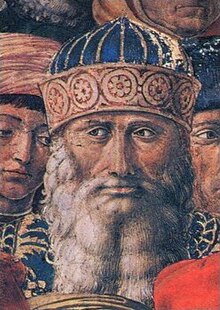Georgios Gemistos Plethon
| Gemistus Pletho | |
|---|---|

Portrait of Gemistus Pletho, detail of a fresco by acquaintance Benozzo Gozzoli, Palazzo Medici Riccardi, Florence, Italy
|
|
| Born | 1355 Constantinople |
| Died | 1452/1454 Mystras |
| Era | Renaissance philosophy |
| Region | Western philosophy |
| School | Neoplatonism |
|
Main interests
|
Plato's Republic, Ancient Greek religion, Zoroastrianism |
|
Influences
|
|
Georgius Gemistus (Greek: Γεώργιος Γεμιστός; c. 1355 – 1452/1454), later called Plethon (/ˈpliːθɒn, -θən/) or Pletho (/ˈpliːθoʊ/; Πλήθων), was a Greek scholar of Neoplatonic philosophy. He was one of the chief pioneers of the revival of Greek learning in Western Europe. In the dying years of the Byzantine Empire, he advocated a return to the Olympian gods of the ancient world.
He re-introduced Plato's thoughts to Western Europe during the 1438–1439 Council of Florence, a failed attempt to reconcile the East-West schism. Here Pletho met and influenced Cosimo de' Medici to found a new Platonic Academy, which, under Marsilio Ficino, would proceed to translate into Latin all Plato's works, the Enneads of Plotinus, and various other Neoplatonist works.
...
Wikipedia
